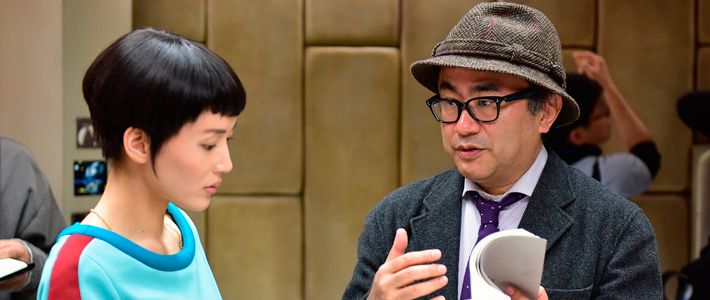
Heretic of Humor: The Hollywood-Classic-Inspired Comedy of Mitani Kōki
Culture- English
- 日本語
- 简体字
- 繁體字
- Français
- Español
- العربية
- Русский
Homage as a Creative Springboard
Mitani Kōki is perhaps best known in Japan as the writer of Furuhata Ninzaburō, a television series that paid homage to the US detective show Columbo. It won a legion of devoted fans over three seasons between 1994 and 1999 and spun off several film specials, including one starring Major League baseball player Suzuki Ichirō. In the 2006 special, Ichirō played a fictionalized version of himself as the murderer.
Furuhata and Columbo share the same premise of a rich or famous person committing a murder, but one major difference is the lighthearted, comedic tone of the Japanese show, where much of the humor stems from the interaction between the main detective, Furuhata Ninzaburō, and his bumbling sidekick Imaizumi Shintarō.
Mitani is also well-known as the playwright who created Jūni nin no yasashii Nihonjin (The Gentle Twelve). The play was first performed in 1990, and a film version was released the following year. As the title suggests, The Gentle Twelve is Mitani’s comedic take on the 1957 courtroom drama Twelve Angry Men directed by Sidney Lumet.
Such classic Hollywood films of the 1950s and 1960s, along with American TV dramas and cartoons, form the creative backbone for Mitani’s work as a playwright, screenwriter, and film director, as he explains:
“When I was a child, there were dubbed Hollywood films broadcast on TV almost every night. These were the same films that my mom had once seen in the movie theater when in her twenties. By the time I entered elementary school I was engrossed in those 1950s and 1960s Hollywood films.”
A Billy Wilder Fan from a Young Age
The Hollywood movies that left the strongest impression on Mitani were The Apartment, Irma la Douce, and Some Like It Hot—all starring Jack Lemmon—and Love in the Afternoon, starring Audrey Hepburn.
“Since I was only eight or nine at the time,” Mitani recalls, “I wasn’t aware that they were all directed by Billy Wilder—and I didn’t even know that there was such a job as film director. It was only later that I realized that these films I loved so much had all been directed by the same person.”
Mitani’s latest film, Gyarakushī kaidō (Galaxy Turnpike), released on October 24 in Japan, is a romantic comedy that shows his great esteem for Wilder’s films. “Since I’d been so inspired by the work of Wilder, I always wanted to make a movie in his cinematic style by creating a romantic comedy that’s a bit risqué. Of course, since I can’t hope to rival him, I took a different approach for my new film by adopting the science fiction genre, which he never used, and having an ensemble cast.”
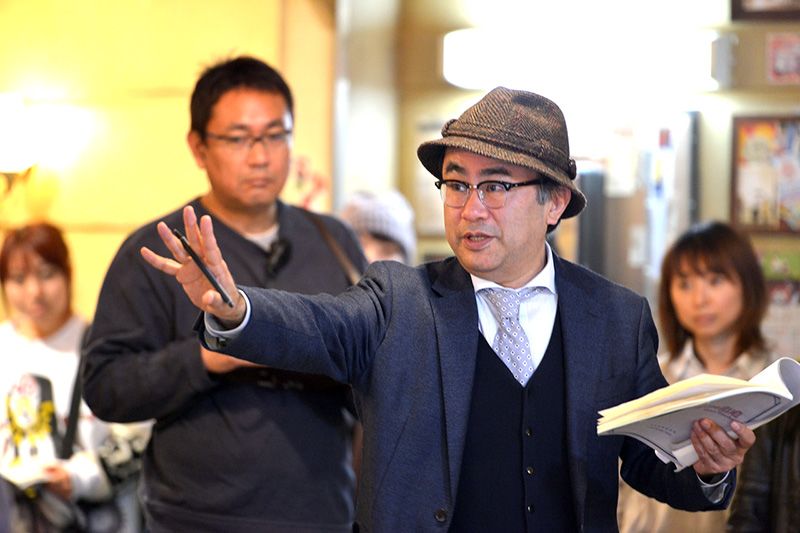 Mitani Kōki on the set of Galaxy Turnpike.
Mitani Kōki on the set of Galaxy Turnpike.
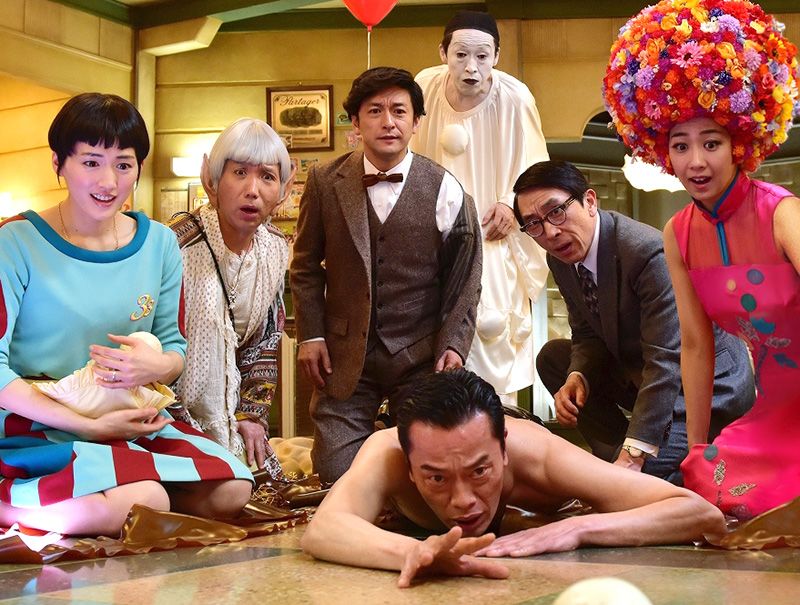 A shot from the “birth” scene of Galaxy Turnpike. © 2015 Fuji Television and Tōhō.
A shot from the “birth” scene of Galaxy Turnpike. © 2015 Fuji Television and Tōhō.
The film is set at a less-than-popular hamburger restaurant in outer space. “The look of the film is modeled after what people back in the 1960s imagined the future would be like,” Mitani points out. “So even though the action takes place in the future, it has a nostalgic feel—calling to mind the world of The Jetsons or Lost in Space.”
The new movie also draws on elements of situation comedies, as Mitani explains:
“The sort of sitcoms that I had in mind are American TV comedies. In those shows, the action is always limited to a certain place, and none of the characters develop in any way—so whenever you watch an episode, you encounter the same people doing the same sort of things. Take Bewitched, for example. In that show, which ran for around 10 years, you can watch whatever episode you like, regardless of the order, and it will be interesting. I like that sort of view of the world. My new movie centers around two main characters, the couple Noa and Noe, at the outer-space hamburger joint. The premise is that we are seeing just one episode of a sitcom, where each time a bunch of aliens stop by the restaurant. So it’s like watching, say, Episode 253 of this show.”
A “Heretical” Comedic Sensibility
Mitani presents the image of a person who has created a bunch of comedies and had fun doing it, but he looks on himself as a bit of a “heretic” who has gone against the grain in Japan.
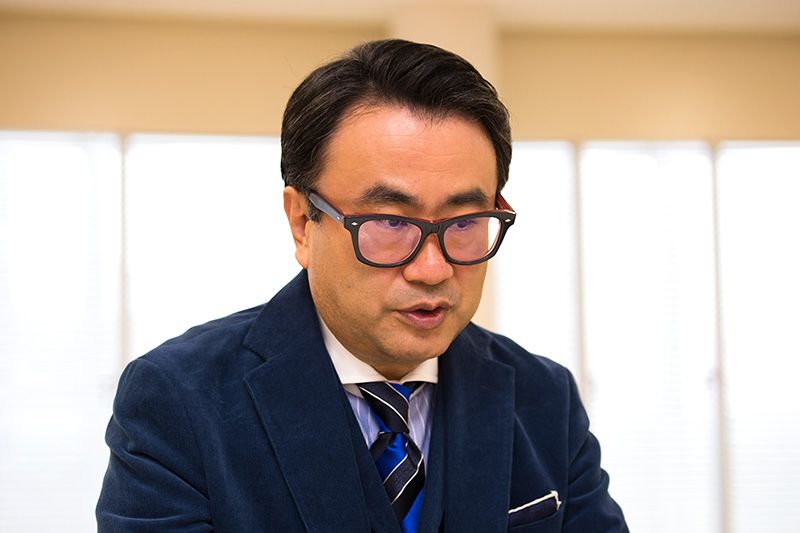 Mitani Kōki discussing his style of comedy that goes against the grain in Japan.
Mitani Kōki discussing his style of comedy that goes against the grain in Japan.
“The essence of the sitcom is a theatrical form that revolves around conversation. The interesting aspects of conversations and human relations are the source of the genre’s charm. But Japanese culture does not really have a deep-rooted comedic tradition. For instance, if someone asks you to list Japan’s outstanding film comedies, you would be hard-pressed to come up with many titles of outright comedies. Around 10 years ago, the American Film Institute released its list of the 100 Funniest American Movies Of All Time. But I don’t think Japan would be able to come up with enough titles to fill a list like that. Even deciding to make a comedy in Japan is to go against the grain, in a sense. And even the comedies that do get made aren’t usually centered on conversational humor. So my own style is a sort of heresy within a heresy.”
Mitani’s brand of comedy has found popularity outside of Japan. His 1997 screen debut Rajio no jikan (Welcome Back, Mr. McDonald), a film adaptation of his play, was awarded the Don Quixote Prize at the Berlin International Film Festival. Mitani recalls what it was like to see the film screened at that festival: “I was sitting in the back of the movie theater and throughout the screening I could hear laughter—much more than you would hear at a movie in Japan. I was even more surprised at the end of the screening, when the lights came back on, that nearly everyone in the audience was German.”
His films—such as Za uchōten hoteru (Suite Dreams; 2006), Za majikku awā (The Magic Hour; 2008), and Sutekina kanashibari (A Ghost of a Chance; 2011)—have also been shown in Taiwan and South Korea. Galaxy Turnpike is a “conversation-based comedy,” Mitani notes, but adds that “none of the comedy relies on word play unique to Japanese, so if the subtitles are translated effectively audiences anywhere should be able to enjoy the humor.”
Viewing Himself as a Screenwriter Above All
Galaxy Turnpike is the seventh film directed by Mitani, who has also been busy over the years writing scripts for the stage or big screen. This role as a writer has been central to Mitani, who describes himself as more of a movie fan than a director.
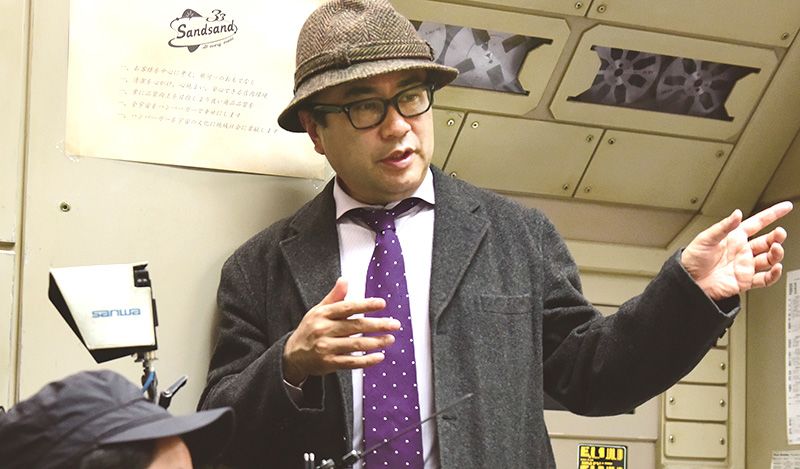 Mitani balances his work for TV and the theater with directing a film every two or three years. © 2015 Fuji Television and Tōhō.
Mitani balances his work for TV and the theater with directing a film every two or three years. © 2015 Fuji Television and Tōhō.
“The most important thing is writing the script,” Mitani plainly notes. “I make a point of setting aside enough time to dedicate to that work. Without creating a script, there is no way for me to shoot a film or direct a play.”
At the moment, he is engrossed in writing the screenplay for the NHK year-long historical TV drama Sanada Maru, which will debut in January 2016. “To finish in time, I need to turn out a screenplay for an episode every week, so this is taking up almost all my time now.”
Eager to Try Other Genres
Despite his hectic schedule, Mitani looks forward to making a film every few years. Keeping this pace has helped him remain full of enthusiasm for moviemaking.
“Basically I view myself as a writer. My approach has always been that I’m a scriptwriter who happens to make movies. And since I’m also a movie fan, one thing I love to do is to try to re-create in my films the genres that I have enjoyed as a moviegoer. I’ve made a period film and now a science fiction movie, and someday I’d like to have a go at making a silent movie, a war flick, or even a musical.”
The possibility of creating an original musical sprang to Mitani’s mind after he watched a DVD that included a short skit performed by the comedy jazz band Crazy Cats. The skit was set in outer space and featured Ueki Hitoshi, a member of the group, singing and dancing with no regard to the the scientific realism of zero gravity. Maybe in the near future Mitani will even try his hand at bringing a full-scale musical to the big screen.
(Based on an interview by the Nippon.com editorial team. Banner photo: Mitani Kōki on the set of Galaxy Turnpike with actress Ayase Haruka. © 2015 Fuji Television and Tōhō.)